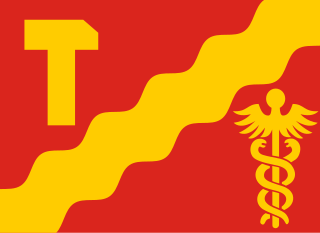
Tampere is a city in Finland and the regional capital of Pirkanmaa. It is located in the Finnish Lakeland. The population of Tampere is approximately 260,000, while the metropolitan area has a population of approximately 423,000. It is the 3rd most populous municipality in Finland, and the second most populous urban area in the country after the Helsinki metropolitan area.

Finland attracted over 6.8 million foreign tourists in 2018, with 53 percent coming from other European Union states. In 2017, the value added by tourism was about 4.6 billion euros, or 2.6% of the Finnish GDP, providing approximately 140,200 jobs.
Tampere University of Technology (TUT) was Finland's second-largest university in engineering sciences. The university was located in Hervanta, a suburb of Tampere. It was merged with the University of Tampere to create the new Tampere University on 1 January 2019.

The Centre Party, officially the Centre Party of Finland, is an agrarian-centrist political party in Finland. Ideologically, the Centre Party is positioned in the centre of the political spectrum. It has been described as liberal, social-liberal, liberal-conservative, and conservative-liberal. The party’s leader is Antti Kaikkonen, who was elected in June 2024 to succeed former minister Annika Saarikko. As of June 2023, the party has been a part of the parliamentary opposition.

Aamulehti is a Finnish-language daily newspaper published in Tampere, Finland. Established in 1881 by Finnish patriots in Tampere, the newspaper aimed to bolster the Finnish language and people's identity during Russia's reign over Finland. Throughout the Cold War, Aamulehti was accused by the Soviet Union of spreading US propaganda, leading to protests from the Soviet Embassy in Helsinki. In the 1980s, the newspaper's parent company acquired and later closed down Uusi Suomi. In 2014, Aamulehti transitioned from broadsheet to tabloid format.
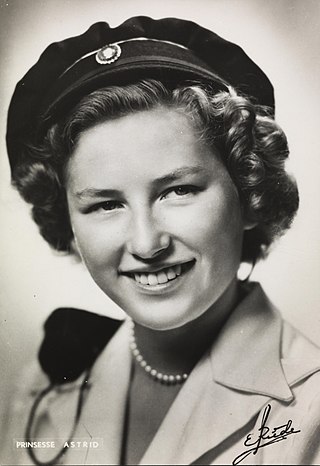
Princess Astrid, Mrs. Ferner is the second daughter of King Olav V and his wife, Princess Märtha of Sweden. She is the older sister of King Harald V of Norway and younger sister of the late Princess Ragnhild.
The University of Tampere (UTA) was a public university in Tampere, Finland that was merged with Tampere University of Technology to create the new Tampere University on 1 January 2019.
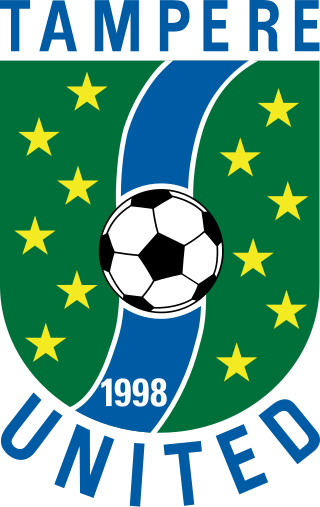
Tampere United is a Finnish football club from the city of Tampere. The club plays in Kakkonen, the fourth highest level of football in Finland.

Tampere–Pirkkala Airport, or simply Tampere Airport, is located in Pirkkala, Finland, 7 nautical miles south-west of Tampere city centre. The airport is the sixth-busiest airport in Finland, as measured by the total number of passengers, and the third-busiest as measured by the number of international passengers.

Oras Tynkkynen is a Member of the Parliament of Finland, representing the Green League. Tynkkynen was the chair of the Green parliamentary group. He served as Prime Minister Matti Vanhanen's Advisor on Climate Policy. Also Tynkkynen is a Member of the City Council of Tampere and an environmental activist. He has also held positions in numerous other organisations, such as Friends of the Earth Finland. Oras Tynkkynen became a member of Parliament in 2004 as a replacement when Satu Hassi left her seat upon her election to the European Parliament. He was directly elected to the Parliament in 2007.

The Battle of Tampere was a 1918 Finnish Civil War battle, fought in Tampere, Finland from 15 March to 6 April between the Whites and the Reds. It is the most famous and the heaviest of all the Finnish Civil War battles. Today it is particularly remembered for its bloody aftermath as the Whites executed hundreds of capitulated Reds and took 11,000 prisoners who ended up in the Kalevankangas camp.
Tampere University is a multidisclipinary public university located in the city of Tampere, Finland. It is the second largest university in the country by student enrollment.

Anarchism in Sweden first grew out of the nascent social democratic movement during the later 19th century, with a specifically libertarian socialist tendency emerging from a split in the movement. As with the movements in Germany and the Netherlands, Swedish anarchism had a strong syndicalist tendency, which culminated in the establishment of the Central Organisation of the Workers of Sweden (SAC) following an aborted general strike. The modern movement emerged during the late 20th century, growing within a number of countercultural movements before the revival of anarcho-syndicalism during the 1990s.
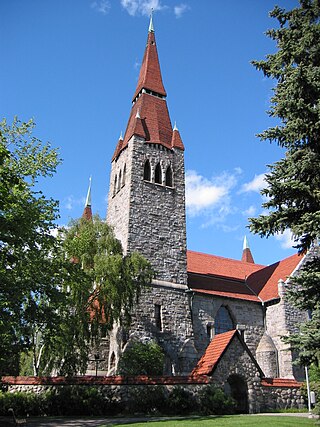
Tampere Cathedral is a Lutheran church in Tampere, Finland, and the seat of the Diocese of Tampere. The building was designed in the National Romantic style by Lars Sonck, and built between 1902 and 1907.
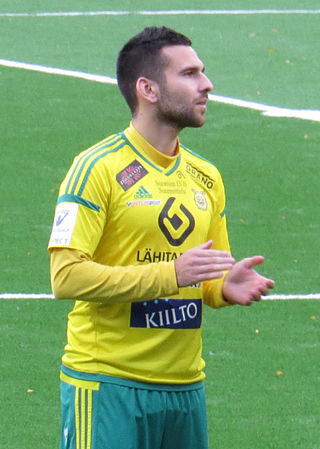
Tomi Petrescu, is a Finnish professional football winger and attacking midfielder who plays for Finnish club Jyväskylä Blackbird and has represented Finland national under-21 football team. Petrescu was born in Jyväskylä, Finland where he played for the local JJK youth team before moving to Leicester City F.C.

The Tampere light rail, branded as Tampere Tram, is a public transport system in Tampere, Finland. In November 2016, the Tampere city council approved plans to construct a 330-million-euro light rail system on the route from the city centre to Hervanta and to the Tampere University Hospital. Traffic on the first two lines of the route began on 9 August 2021.

The SPL Tamperen piiri(Tampere Football Association) was one of the 12 district organisations of the Football Association of Finland. It administered lower tier football in Tampere.

The Battle of Ruovesi was a major battle during the Finnish Civil War and on the Eastern Front of World War I fought in Ruovesi, Finland from 5 February to 19 March 1918 between the Whites and the Reds with support for the latter from Russian volunteers.
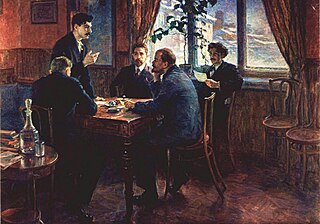
The first conference of the Russian Social Democratic Labour Party (RSDLP) took place in Tampere (Tammerfors), Grand Duchy of Finland, in December 1905. Held between the 1905 London and 1906 Stockholm party congresses at the Tampere Workers' Hall, the conference was an unofficial meeting of the Bolshevik faction of the party. It is particularly remembered for playing host to the first meeting of Vladimir Lenin and Joseph Stalin. The conference resolved to forgo participation in the new State Duma, as did most of the far left parties. They later reversed this decision in 1907.
Anarchism in Finland dates back to the early revolutionary movements of the 20th century, seeing organized activity begin in the 1960s.















